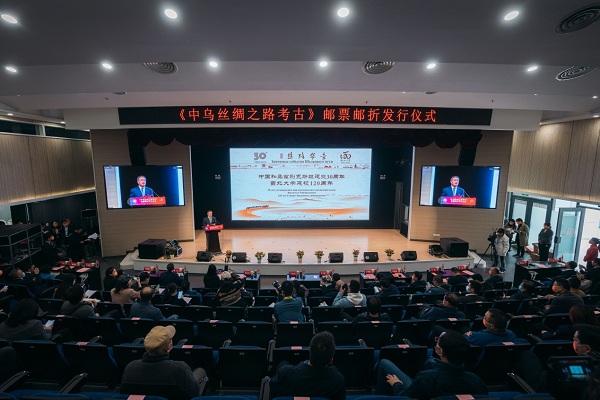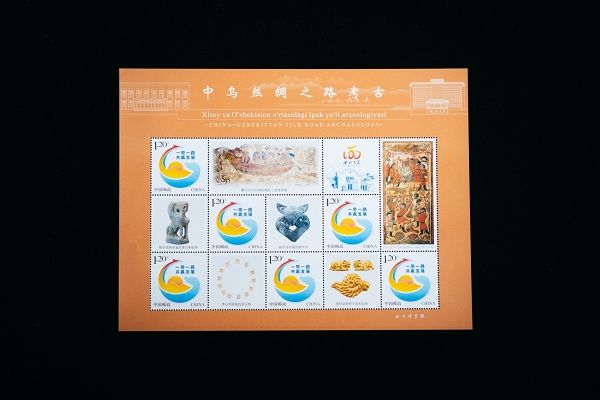This year coincides with the 30th anniversary of the establishment of diplomatic relations between China and Uzbekistan, and their postal departments have issued a set of stamps with the theme of their joint archaeological achievements.
On Nov 4, the official release of the stamp set entitled China-Uzbekistan Silk Road Archaeology was held at the Chang'an campus of Northwest University (NWU) in Xi'an, capital of Northwest China's Shaanxi province.

The release ceremony for the stamp set entitled China-Uzbekistan Silk Road Archaeology is held at NWU in Xi'an on Nov 4. [Photo provided by Northwest University]
At the release ceremony, Jiang Yan, Chinese ambassador to Uzbekistan, said that the stamps will further boost the mutual understanding between the people of China and Uzbekistan and tighten people-to-people bonds.
Farhod Arziev, Uzbekistan's ambassador to China, said that the stamps issued by Northwest University are unique and symbolize the friendship and history of the two countries dating back thousands of years.
It is hoped that Uzbekistan's higher education institutions will further strengthen their partnerships with NWU and carry out multi-field cooperation, he added.

The set of stamps called China-Uzbekistan Silk Road Archaeology. [Photo provided by Northwest University]
The stamps are composed of seven issued by the Postal Service of Uzbekistan and six issued by the China Post, showing the archaeological achievements of the China-Uzbekistan Silk Road archaeology and the east Tianshan archaeological team of NWU.
The archaeological team of NWU, with its mission of protecting and inheriting the Silk Road civilization, has cooperated with universities and academic institutions in Uzbekistan – to carry out joint archaeology from the east Tianshan mountain in Northwest China's Xinjiang Uygur autonomous region to the west Tianshan mountain in Uzbekistan.
In Samarkand and other places, the archaeological team of NWU has made a series of major archaeological achievements, making important efforts to reveal the diverse, splendid and harmonious historical and cultural features along the Silk Road.
Moving forwards, plans are for NWU to deepen its research cooperation and cultural exchanges between universities and academic institutions in Central Asian countries, based on the Silk Road Archaeology Cooperative Research Center and the China-Central Asia Human and Environment Belt and Road Joint Laboratory.
原文链接:http://en.xa.gov.cn/services/study/collegesand/4738.htm